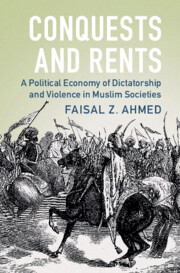Book contents
- Conquests and Rents
- Political Economy of Institutions and Decisions
- Conquests and Rents
- Copyright page
- Dedication
- Contents
- Figures
- Tables
- Acknowledgments
- Part I A Political Economy Approach
- Part II The Institutional Legacy of Muslim Conquest
- 3 The Conquest Equilibrium
- 4 Conquest Fostered Autocratization
- 5 The Autocratic Legacy of Muslim Conquest
- Part III The Impact of Contemporary Rents on Dictatorship and Violence
- Part IV Conclusion
- References
- Index
4 - Conquest Fostered Autocratization
from Part II - The Institutional Legacy of Muslim Conquest
Published online by Cambridge University Press: 01 June 2023
- Conquests and Rents
- Political Economy of Institutions and Decisions
- Conquests and Rents
- Copyright page
- Dedication
- Contents
- Figures
- Tables
- Acknowledgments
- Part I A Political Economy Approach
- Part II The Institutional Legacy of Muslim Conquest
- 3 The Conquest Equilibrium
- 4 Conquest Fostered Autocratization
- 5 The Autocratic Legacy of Muslim Conquest
- Part III The Impact of Contemporary Rents on Dictatorship and Violence
- Part IV Conclusion
- References
- Index
Summary
This chapter employs statistical analysis to evaluate the historical narrative from the chapter 3 using. The account in chapter 3 generated a sequence of testable implications linking Muslim military conquest to various political outcomes in conquered territories. First, conquest introduced institutions that consolidated political (absolutist) authority in subjugated territories during the initial period of Muslim conquest. Second, these more autocratized structures remained intact thereafter, particularly under Mongol/Turkic and Ottoman rule (up through the 1800s). Third, the prevalence of centralized autocratic institutions affected the European colonial strategy: it incentivized the use of indirect rule by colonial powers and concomitantly reduced European migration to territories conquered by Muslim armies (relative to non-conquered territories). Fourth, upon their independence, Muslim countries largely maintained their autocratic structures, institutions that remain today. This chapter provides statistical evidence examining the initial two steps: the period of Muslim conquest was associated with a centralization of political authority which persisted through the 1800s.
- Type
- Chapter
- Information
- Conquests and RentsA Political Economy of Dictatorship and Violence in Muslim Societies, pp. 100 - 132Publisher: Cambridge University PressPrint publication year: 2023

